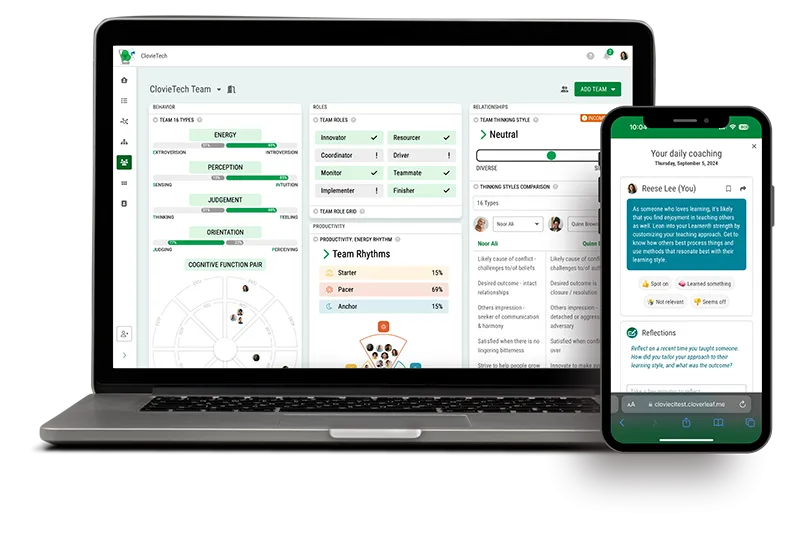One of the most pressing challenges for coaches and consultants today is proving the measurable impact of their work. Coaching, while transformational for individuals and teams, often delivers its most profound results in areas that can seem intangible—qualities like improved self-awareness, enhanced communication, and better conflict resolution. These competencies shape the fabric of high-performing teams. Yet, many leadership teams struggle to see the ROI because traditional metrics don’t easily capture the link between these human-centered skills and hard business outcomes. To bridge this gap, coaches must focus on competency-based coaching, which allows for measurable, high-impact results that resonate with organizational goals.
Recent research underscores an urgent need for this targeted approach to development. According to Gartner, although 76% of organizations are increasing their investment in leadership coaching and programs, only 36% of HR leaders feel these initiatives effectively prepare leaders for the future. This shortfall highlights the competency gap—a gap that coaching is uniquely equipped to address. Similarly, Deloitte’s studies show that 87% of employees view human skills like adaptability and communication as essential to career advancement. Yet, only a slim majority feel that their organizations recognize these skills’ importance. For today’s organizations, the stakes are high: in a rapidly evolving work environment, leaders who lack key competencies can limit a team’s productivity, engagement, and adaptability.
This article makes the case that coaching can directly bridge this competency gap by focusing on targeted, measurable growth in the skills that leadership teams value most. By identifying and developing specific competencies, coaches can empower employees to reduce costly mistakes, communicate more effectively, and make faster, better decisions—transformative improvements that extend beyond individual growth and influence organizational culture and business results.
With the right tools, coaches can go beyond anecdotal evidence and demonstrate their value with insightful data on competency growth. By tracking improvements in areas like conflict resolution or collaboration, coaches can show leadership concrete results that tie directly to productivity, efficiency gains, and engagement and retention metrics. Through this competency-driven approach, coaching emerges not just as a developmental resource but a data-backed, strategic investment that drives sustainable growth and competitive advantage for the organization.
The following offers a practical guide for coaches to demonstrate coaching ROI in a way that resonates with leadership priorities. It provides the data, strategies, and real-world examples needed to make coaching’s impact unmistakable.
Get the High Impact Coach Crash Course to see how to build a coaching business that delivers more value, serves more clients, and grows more revenue without burning you out.
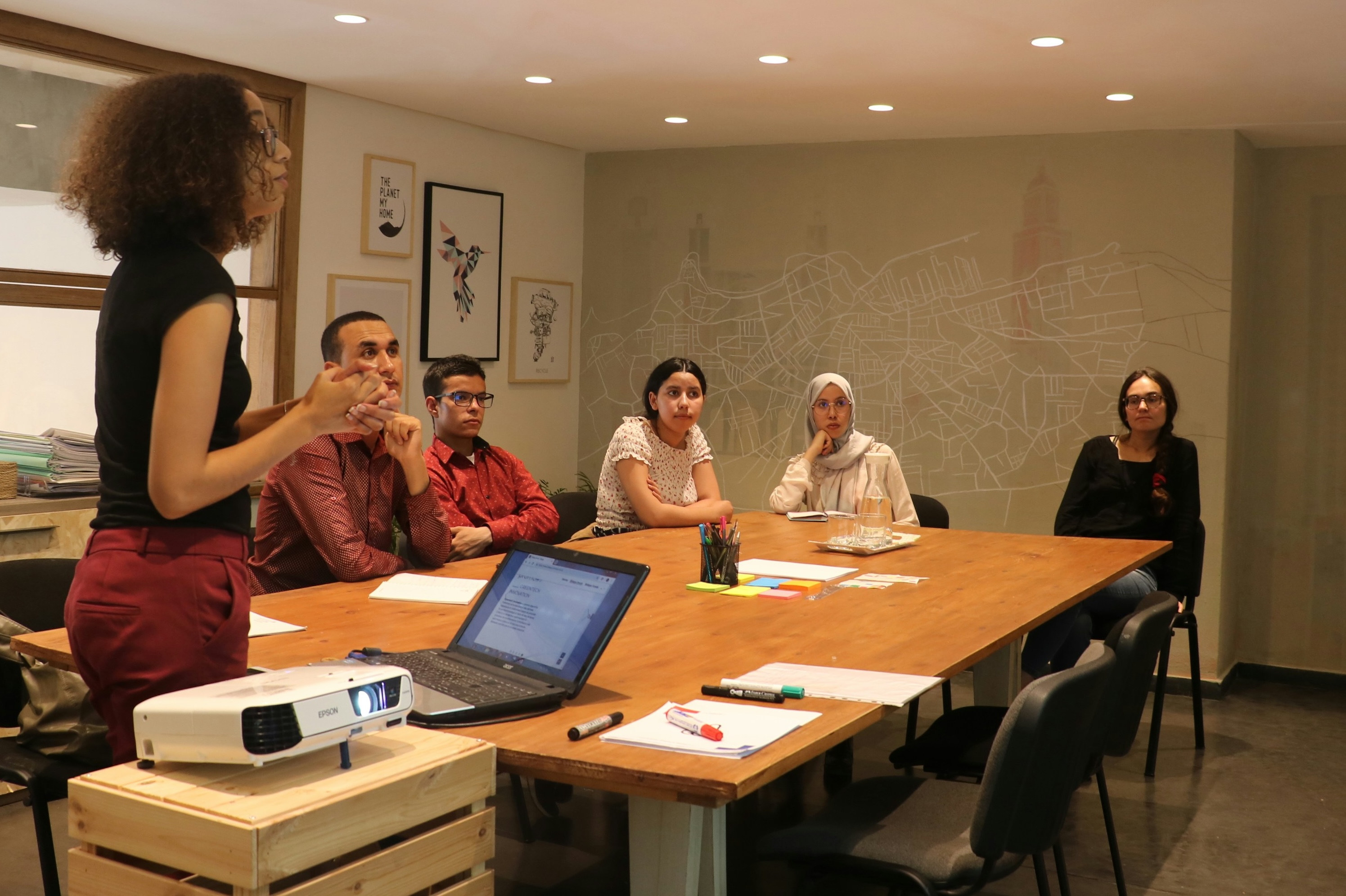
The New Metric To Measure The Impact Of Coaching
For experienced coaches, demonstrating the ROI of coaching through competency growth means showing leadership not just the qualitative benefits but quantifiable change that aligns with business objectives. Metrics that matter to leadership—like productivity, team efficiency, and engagement—are often shaped by core competencies such as self-awareness, conflict resolution, communication, and collaboration. If coaches can connect improvements in key competencies, they can also provide leadership with concrete evidence of coaching’s value by linking personal development directly to organizational performance.
Quantifying Core Competencies To Prove Coaching ROI
Traditional tools like surveys can capture sentiment, but they rarely prove a direct link between development programs and performance outcomes. Leaders in talent development are increasingly seeking ways to measure the actual impact of coaching beyond satisfaction scores, which often lack the depth needed to demonstrate ROI. Rather than defining ROI in terms of immediate financial returns, coaching ROI is best measured through competency growth—the foundation that empowers employees to make better decisions, communicate more effectively, and collaborate productively.
By quantifying improvements in core competencies like self-awareness, conflict resolution, communication, and collaboration, coaches can provide leadership with concrete evidence of coaching’s value. This approach positions coaching as a strategic investment that directly drives key business outcomes, such as productivity, engagement, and operational efficiency.
See How Cloverleaf Increases Coaching ROI
Identifying Key Competencies as Performance Drivers
While leadership teams may be interested in productivity metrics, it’s essential to demonstrate how competencies like self-awareness, communication, and collaboration directly contribute to improved. Here’s how coaches can measure and communicate their impact:
A. Self-Awareness: Self-awareness helps employees recognize their tendencies and adapt their behavior accordingly, leading to more intentional and balanced decision-making. Cloverleaf’s platform further enables this growth, with recent studies showing an 18% increase in feelings of value and recognition among teams using Cloverleaf’s Automated Coaching™, creating an environment of accountability and enhanced job satisfaction that leaders can quantify.
B. Conflict Resolution: Conflict resolution is integral to productivity, as unresolved workplace conflict can become a significant drain on resources. A study from CPP Global found that workplace conflict costs U.S. companies approximately $359 billion annually due to time lost managing disputes. Another study by Pollack Peacebuilding Systems found that conflict negatively affects productivity, with employees spending more time resolving conflicts. Coaches who focus on building conflict resolution skills help teams address issues proactively, saving time and reducing project delays.
Cloverleaf’s platform allows coaches to track conflict resolution improvements. A recent study reported a 36% increase in perceived high-quality teamwork among teams using automated coaching tools.
C. Communication: Misunderstandings and inefficiencies can cost teams nearly a full workday each week—an average of 7.47 hours—due to lost time from poor communication (Grammarly State of Business Communication). Cloverleaf’s Automated Coaching™ provides real-time data on communication effectiveness, with recent data showing a 31% improvement in the quality of communication and collaboration. This metric offers leaders concrete insights into how coaching enhances workflow efficiency and reduces rework time, allowing teams to reclaim lost productivity.
D. Collaboration: Collaboration creates innovation and improves project outcomes by combining diverse perspectives. Yet, studies show that only 27.6% of training budgets are dedicated to soft skills like collaboration.Teams that use tools to improve collaboration through personalized, ongoing coaching about working with cross-functional teams and managing different work styles have experienced a 36% increase in quality collaboration, leading to improved cross-functional communication and faster project timelines—outcomes that directly support leadership’s goals of efficiency and innovation.

Reevaluating ROI in Coaching: Competence as the True Metric
For coaching to demonstrate its full value, ROI should be redefined in terms of competency development rather than direct financial gain. Competency growth lays the foundation for the performance improvements leadership wants to see, yet these skills must be applied meaningfully within the organization. As noted in recent insights, ROI in coaching truly materializes when leaders support the implementation of these skills in daily operations, reinforcing the idea that coaching is a long-term investment in both human capital and organizational resilience.
To align coaching with strategic goals, coaches and leaders can collaborate to design assessments that capture skill application in ways that resonate with business needs. For example, a leader who has received coaching in conflict resolution could track improvements in project timelines or reductions in turnover—metrics that connect competency development to clear business value. As Szilvia Olah insightfully notes in this LinkedIn post, ROI in L&D isn’t about money in, money out; it’s about building competence that drives performance. When leaders understand and support this concept, they create an environment where coaching delivers actionable, data-backed outcomes that impact the bottom line.
By focusing on measurable competency growth, coaches can present coaching as a strategic asset that enhances productivity, efficiency, and engagement—demonstrating ROI in theory and practical, quantifiable outcomes that leadership values.
How to Connect Coaching Impact Directly to Competency Gains and Business ROI
To make coaching’s value unmistakable to leadership, connect competency gains to the metrics that matter most to the organization’s bottom line. Focus on how coaching impacts productivity and performance. Use data points, like improvements in project delivery times or reductions in turnover, to demonstrate how coaching contributes to key business goals.
1. Individual-Level Impact: Self-Awareness Drives Smarter Decisions
Show the Value: Increased self-awareness empowers employees to make better decisions, minimizing costly errors and boosting accuracy.
Make It Measurable: Track post-coaching metrics such as error reduction and improved efficiency. Regularly updated, these metrics demonstrate sustained impact.

2. Team-Level Impact: Conflict Resolution and Collaboration Fuel Efficiency
Show the Value: Effective conflict resolution and collaboration lead teams to complete projects faster, with fewer resources.
Make It Measurable: Use tools like Cloverleaf’s Automated Coaching™ to capture teamwork improvements, presenting clear data on project timelines, cost reductions, and team satisfaction.
Case Study: Real-World Results with Automated Coaching™
Context: A large financial services firm leveraged Cloverleaf’s Automated Coaching™ to enhance both individual and team performance.
Results: Employees improved decision-making, reducing errors by 18%. Teams completed projects 20% faster and cut resource use by 12%. The firm also saw a 10% rise in engagement and a 15% drop in turnover over a one-year period.
Key Takeaway for Leadership: Present these metrics as cumulative benefits that show ongoing impact on both performance and cost savings.
3. Align Competency Gains with Leadership’s Priorities
Show the Value: By focusing on productivity gains, cost efficiency, and employee retention, connect coaching outcomes to leadership’s core objectives.
Make It Measurable: Highlight how coaching has improved project delivery times, reduced turnover, or enhanced customer satisfaction. Use data to reinforce competency growth as a long-term investment.
4. Craft a Narrative of Sustained Value
Show the Value: Emphasize competency growth as an ongoing organizational asset that builds resilience and agility.
Make It Measurable: Support your narrative with quarterly or annual updates, creating a continuous ROI story that reinforces coaching’s role in long-term growth.
Demonstrating Coaching’s Lasting Value through Competency-Driven ROI
By linking competency gains to measurable outcomes, coaches can offer leadership a clear picture of coaching’s tangible impact on the organization’s most important goals.
To keep coaching top of mind as a strategic asset:
- Prioritize Relevant Metrics: Continuously connect coaching outcomes to the metrics that resonate most with leadership—whether that’s project efficiency, employee retention, or improved decision-making.
- Make Data-Driven Reporting Routine: Establish a consistent reporting cadence, using data to show how coaching’s benefits accumulate over time and adapt to the organization’s evolving needs.
- Emphasize Long-Term Growth: Remind leadership that competency development is an ongoing journey that builds the organization’s resilience, adaptability, and competitive advantage.
Taking these steps can empower coaches to prove the ROI of coaching and position it as an essential, sustained contributor to business success.
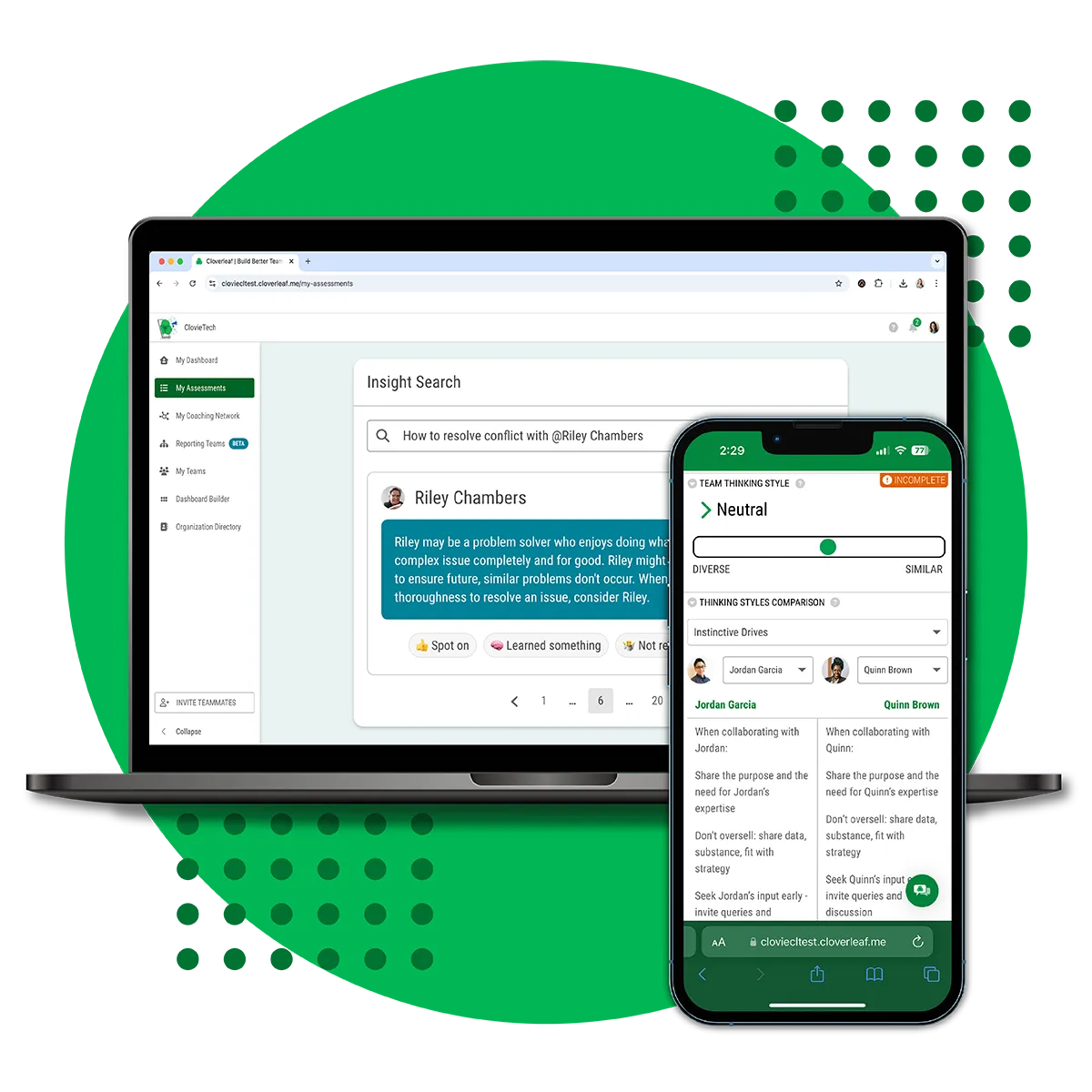
Using Coaching Technology to Prove Competency Growth in Real-Time
For coaches and consultants who already bring incredible value to their clients, finding additional ways to measure the ongoing impact of coaching between sessions can be challenging. Cloverleaf’s Automated Coaching™ creates a powerful way to extend the impact to help clients see measurable development. By delivering ongoing, personalized insights directly into the flow of work, Automated Coaching™ helps coaches demonstrate growth in essential competencies like communication, collaboration, and conflict resolution—providing proof points that reinforce the value of coaching and matter to leadership.
1. Extend Impact Beyond Sessions: Measurable Daily Development with Automated Coaching™
While scheduled sessions allow for deep dives into personal and professional growth, automated coaching tools provide ongoing development opportunities through daily, actionable nudges delivered directly within the tools your clients use every day. On average, Cloverleaf users experience nine micro-coaching “moments” each day, building on what they’ve learned in sessions to reinforce continuous engagement with coaching and growth in competencies like communication, collaboration, and self-awareness.
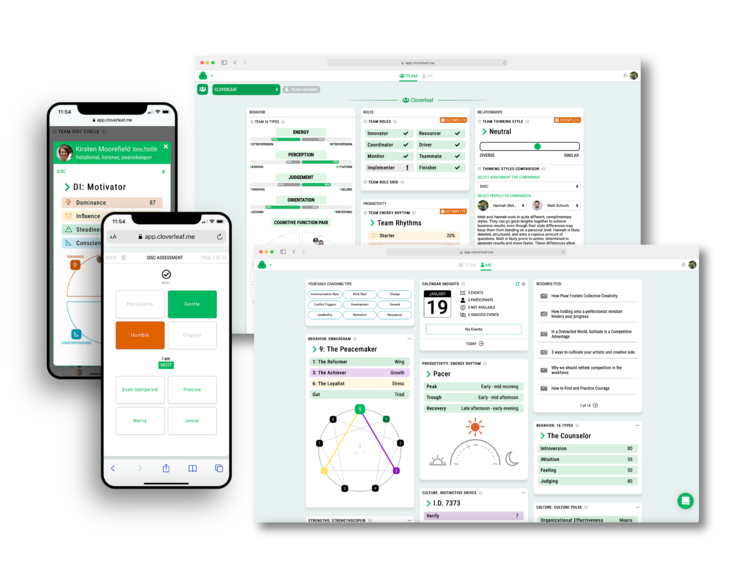
2. Track and Visualize Impact with Personalized Dashboards
Cloverleaf’s Automated Coaching™ dashboards give coaches a way to demonstrate the value of their work through real-time data on individual and team competency growth. These dashboards offer clear, visual insights into how coaching shapes behaviors over time in key areas such as conflict resolution, teamwork, and communication.
Coaches can use this data to:
- Quantify Skills Development: Show clients or organizational leaders how team competencies are improving with tangible metrics.
- Demonstrate Business Value: For example, track how improvement in conflict resolution skills leads to fewer project delays or how better communication reduces rework time—specific metrics that reveal the financial and operational benefits of coaching.
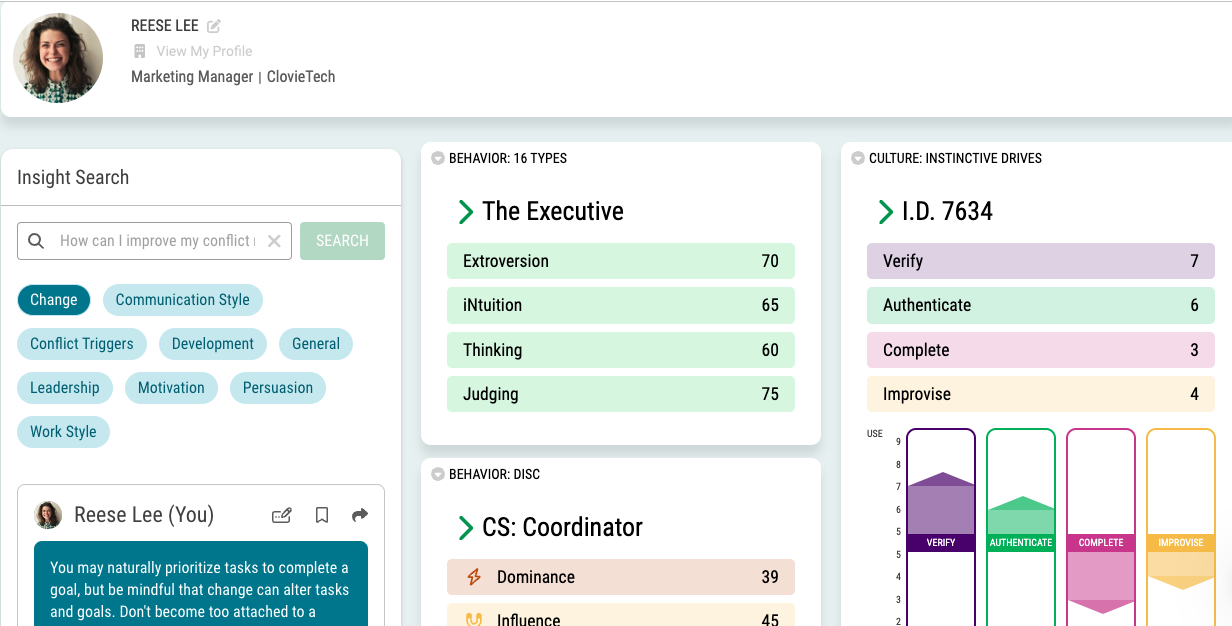
3. Personalize Coaching Focus for Relevant, Targeted Guidance
Coaching is most impactful when it’s relevant to the individual’s unique role and goals. Cloverleaf’s Coaching Focus feature allows coaches to personalize daily coaching insights for each user, aligning with specific objectives to make development both actionable and directly applicable. Whether a team lead is enhancing their feedback skills or a team member is building collaboration capabilities, Automated Coaching™ tailors insights to make growth continuous and meaningful.
Example: A team leader focused on improving communication receives targeted guidance on adapting to each team member’s preferred communication style. This not only enhances their growth but also strengthens team cohesion, providing both immediate and long-term value to the leader’s development journey.
4. Embedding Competency Growth into Daily Workflows
By delivering coaching insights directly within day-to-day workflows, Cloverleaf empowers coaches to create a continuous learning experience that complements their live sessions. Automated Coaching™ reinforces coaching goals, making growth more measurable and actionable:
- Context-Specific Microlearning: Delivered when and where it’s needed, these insights help individuals apply skills in real time, keeping development momentum strong.
- Research-Backed Precision: Automated Coaching™ delivers insights rooted in well-established assessments and proven research, ensuring that each coaching moment is accurate, relevant, and tailored to real growth needs.
Proving ROI with Continuous, Data-Backed Competency Growth
Cloverleaf’s Automated Coaching™ gives coaches the tools to provide evidence-based updates on progress, making it easier to present coaching as a measurable, strategic investment. With data on competency development and tools to drive improvements in key areas, coaches can share regular updates with clients or leadership, proving coaching’s long-term ROI and demonstrating the sustained value of their work.
Positioning Your Coaching as an Essential Driver of Organizational Success
Coaches, your expertise shapes competencies that drive not only individual growth but also the larger goals of any organization. By partnering with convincing and measurable data from tools like Cloverleaf’s Automated Coaching™, you can take your impact even further—bridging the gap between development and demonstrable business results.
Take the Next Step: Use this guide as your blueprint for demonstrating coaching ROI in a way that truly resonates with leadership. Quantify the improvements you see in essential competencies, craft stories that connect growth to measurable outcomes, and position your work as a core contributor to organizational success.
Coaching isn’t just valuable; it’s vital. Let your results speak for themselves—proving that coaching is more than a program; it’s a strategic asset driving productivity, resilience, and long-term growth.
Ready to make your coaching more scalable—and your outcomes more visible?
The High-Impact Coach Crash Course shows you how to grow your business, reinforce client results between sessions, and connect your work to outcomes organizations care about.
👉 Start the Free Crash Course and learn how to scale your coaching without adding more hours—or losing your edge.



